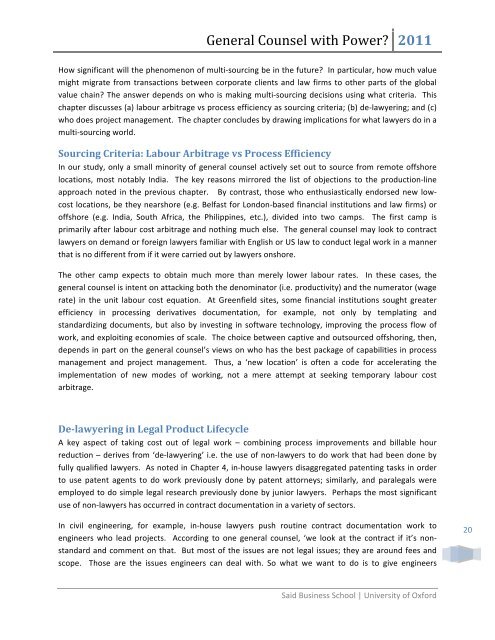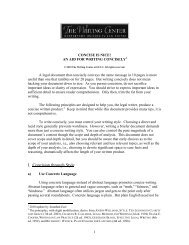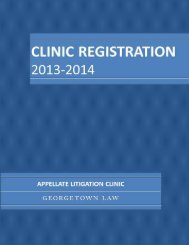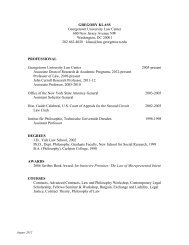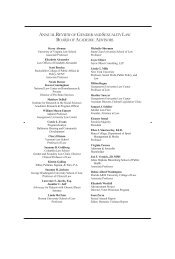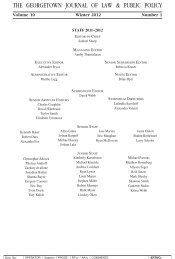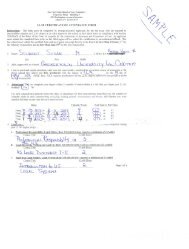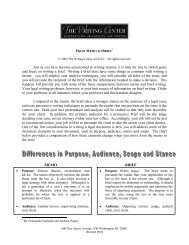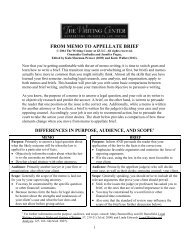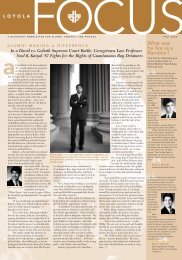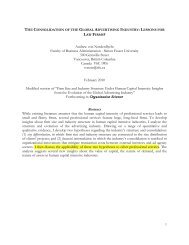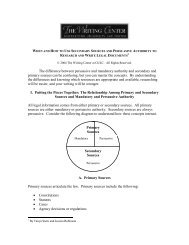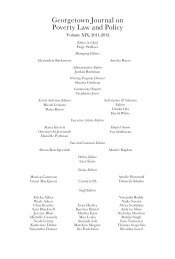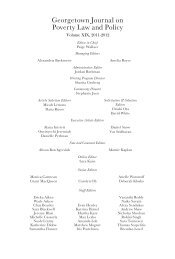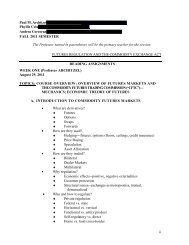Date: April 12, 2013 Topic: The Shrinking ... - Georgetown Law
Date: April 12, 2013 Topic: The Shrinking ... - Georgetown Law
Date: April 12, 2013 Topic: The Shrinking ... - Georgetown Law
You also want an ePaper? Increase the reach of your titles
YUMPU automatically turns print PDFs into web optimized ePapers that Google loves.
General Counsel with Power? 2011 <br />
How significant will the phenomenon of multi-‐sourcing be in the future? In particular, how much value <br />
might migrate from transactions between corporate clients and law firms to other parts of the global <br />
value chain? <strong>The</strong> answer depends on who is making multi-‐sourcing decisions using what criteria. This <br />
chapter discusses (a) labour arbitrage vs process efficiency as sourcing criteria; (b) de-‐lawyering; and (c) <br />
who does project management. <strong>The</strong> chapter concludes by drawing implications for what lawyers do in a <br />
multi-‐sourcing world. <br />
Sourcing Criteria: Labour Arbitrage vs Process Efficiency <br />
In our study, only a small minority of general counsel actively set out to source from remote offshore <br />
locations, most notably India. <strong>The</strong> key reasons mirrored the list of objections to the production-‐line <br />
approach noted in the previous chapter. By contrast, those who enthusiastically endorsed new low-cost<br />
locations, be they nearshore (e.g. Belfast for London-‐based financial institutions and law firms) or <br />
offshore (e.g. India, South Africa, the Philippines, etc.), divided into two camps. <strong>The</strong> first camp is <br />
primarily after labour cost arbitrage and nothing much else. <strong>The</strong> general counsel may look to contract <br />
lawyers on demand or foreign lawyers familiar with English or US law to conduct legal work in a manner <br />
that is no different from if it were carried out by lawyers onshore. <br />
<strong>The</strong> other camp expects to obtain much more than merely lower labour rates. In these cases, the <br />
general counsel is intent on attacking both the denominator (i.e. productivity) and the numerator (wage <br />
rate) in the unit labour cost equation. At Greenfield sites, some financial institutions sought greater <br />
efficiency in processing derivatives documentation, for example, not only by templating and <br />
standardizing documents, but also by investing in software technology, improving the process flow of <br />
work, and exploiting economies of scale. <strong>The</strong> choice between captive and outsourced offshoring, then, <br />
depends in part on the general counsel’s views on who has the best package of capabilities in process <br />
management and project management. Thus, a ‘new location’ is often a code for accelerating the <br />
implementation of new modes of working, not a mere attempt at seeking temporary labour cost <br />
arbitrage. <br />
De-lawyering in Legal Product Lifecycle <br />
A key aspect of taking cost out of legal work – combining process improvements and billable hour <br />
reduction – derives from ‘de-‐lawyering’ i.e. the use of non-‐lawyers to do work that had been done by <br />
fully qualified lawyers. As noted in Chapter 4, in-‐house lawyers disaggregated patenting tasks in order <br />
to use patent agents to do work previously done by patent attorneys; similarly, and paralegals were <br />
employed to do simple legal research previously done by junior lawyers. Perhaps the most significant <br />
use of non-‐lawyers has occurred in contract documentation in a variety of sectors. <br />
In civil engineering, for example, in-‐house lawyers push routine contract documentation work to <br />
engineers who lead projects. According to one general counsel, ‘we look at the contract if it’s non-standard<br />
and comment on that. But most of the issues are not legal issues; they are around fees and <br />
scope. Those are the issues engineers can deal with. So what we want to do is to give engineers <br />
20 <br />
Said Business School | University of Oxford


